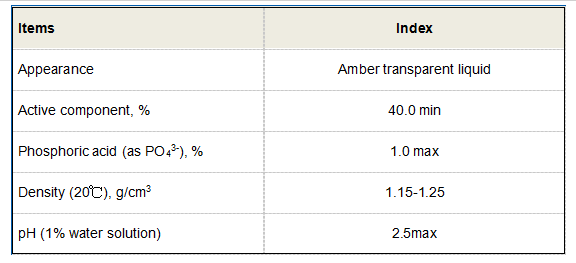scale and corrosion inhibitor chemicals
Understanding Scale and Corrosion Inhibitor Chemicals
In the realm of industrial operations, the management of scale and corrosion is essential for enhancing the efficiency and longevity of equipment. Scale formation and corrosion are two prevalent problems in many sectors, particularly in water treatment, oil and gas, and power generation. Consequently, the use of scale and corrosion inhibitor chemicals has become crucial in ensuring operational efficiency and reducing maintenance costs.
Scale Formation Causes and Consequences
Scale refers to the accumulation of mineral deposits, primarily calcium, magnesium, and silica, on the surfaces of equipment and pipelines. This phenomenon is often caused by the evaporation of water, which concentrates the dissolved minerals, leading to precipitation. The presence of scale can significantly hinder the heat transfer efficiency of machinery, resulting in increased energy consumption and reduced operational efficiency. In severe cases, scale buildup can obstruct pipes and lead to costly downtime and repairs.
The consequences of scale formation extend beyond energy inefficiency. In industries where water is heated or cooled, the insulating layer created by scale can lead to overheating and even equipment failure. Thus, controlling scale formation is imperative, and this is where scale inhibitor chemicals come into play.
Corrosion A Hidden Threat
Corrosion is the gradual deterioration of materials, often metals, due to chemical reactions with their environment. In industrial settings, corrosion can stem from various factors, including moisture, temperature, and the presence of corrosive agents like acids and salts. The effects of corrosion can be catastrophic; it can compromise the integrity of critical infrastructure, leading to leaks, product contamination, and even catastrophic failures.
Like scale, corrosion can result in significant financial burdens for companies. Repairing corroded equipment, replacing components, and managing environmental damages all require substantial resources. Therefore, implementing corrosion inhibitors becomes vital to safeguarding both assets and the environment.
Scale and Corrosion Inhibitor Chemicals A Strategic Solution
Scale and corrosion inhibitor chemicals are specialized formulations designed to prevent or mitigate the formation of scale and the degradation of materials due to corrosion
. These chemicals operate through various mechanisms depending on their specific chemical structures and compositions.scale and corrosion inhibitor chemicals

1. Scale Inhibitors Scale inhibitors, often phosphonates, polyacrylates, or organic acids, impede the crystallization of scale-forming minerals. They work by interfering with the nucleation process, which is essential for the formation of solid scale deposits. By binding to the mineral ions in the fluid, these inhibitors ensure that they remain in solution and do not precipitate out onto surfaces.
2. Corrosion Inhibitors Corrosion inhibitors function by forming a protective layer on metal surfaces, which acts as a barrier between the metal and corrosive agents. Common types of corrosion inhibitors include amines, zinc salts, and phosphates. The effectiveness of these inhibitors depends on several factors, including the type of metal, the environment, and the concentration of the inhibitor.
Application and Benefits
The application of scale and corrosion inhibitor chemicals spans numerous industries, including power generation plants, oil refineries, chemical processing facilities, and HVAC systems. By integrating these chemicals into their operations, companies experience several benefits
- Reduced Maintenance Costs By minimizing scale and corrosion-related damage, businesses can significantly lower repair and replacement costs associated with equipment failure.
- Enhanced Operational Efficiency With improved heat transfer and reduced pressure drops in systems, companies can achieve higher operational efficiencies, leading to decreased energy consumption.
- Increased Equipment Lifespan The protective functions of inhibitors contribute to extending the lifespan of assets, ultimately resulting in cost savings over time.
Conclusion
As industries continue to face challenges related to scale and corrosion, the role of scale and corrosion inhibitor chemicals becomes increasingly vital. These chemicals not only protect valuable equipment but also contribute to more sustainable and efficient industrial practices. By investing in effective inhibition strategies, companies can safeguard their operations, optimize performance, and minimize environmental impact. In a rapidly evolving industrial landscape, the integration of these chemicals represents a proactive approach to asset management and operational resilience.
-
lk-319-special-scale-and-corrosion-inhibitor-for-steel-plants-advanced-solutions-for-industrial-water-systemsNewsAug.22,2025
-
flocculant-water-treatment-essential-chemical-solutions-for-purification-processesNewsAug.22,2025
-
isothiazolinones-versatile-microbial-control-agents-for-industrial-and-consumer-applicationsNewsAug.22,2025
-
scale-inhibitor-key-solutions-for-water-system-scale-preventionNewsAug.22,2025
-
organophosphonates-versatile-scale-inhibitors-for-industrial-water-systemsNewsAug.22,2025
-
scale-and-corrosion-inhibitor-essential-chemical-solutions-for-water-system-maintenanceNewsAug.22,2025





